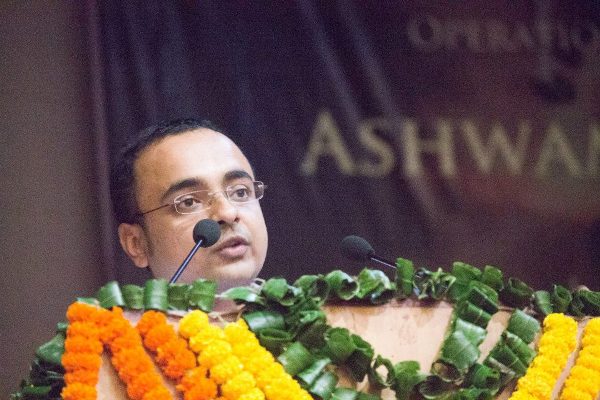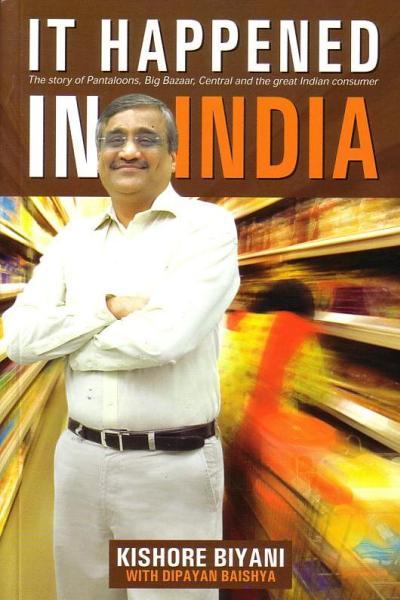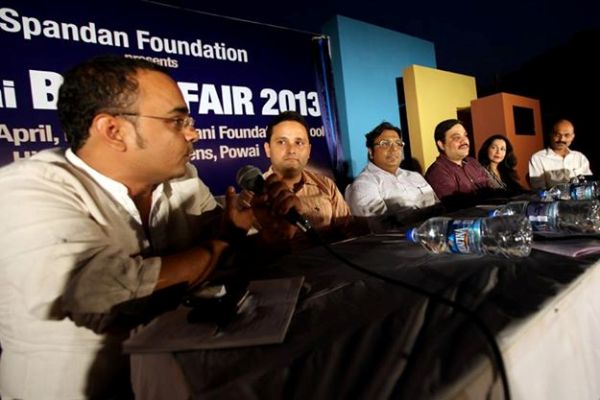Dipayan shares how we need to celebrate entrepreneurship in India and the immense opportunity Centre for Civil Society (CCS) provides students to be critical thinkers.
August 2014
 Dipayan, what’s your story?
Dipayan, what’s your story?
I grew up in Calcutta and I am a former journalist and writer. I started working with Business Today, and then worked with The Economic Times. At ET, I was part of brand equity and corporate dossier features team.
I studied economics at Presidency College in Kolkata, pursued a short course in business journalism from The Wharton School and was a Fulbright Fellow at the Carnegie Mellon University.
I currently work with Future Group, in business strategy and communication. In 2007, I co-authored a book, “It Happened in India’: with Kishore Biyani, the founder and CEO of Future Group and Big Bazaar.
What motivates and keeps you going?
What motivates me very often is capturing and celebrating the story of entrepreneurship in India. India has a rich history of entrepreneurship and we need celebrate it and grow it further. India needs many more entrepreneurs who bring in more choice and convenience for consumers and jobs, income and development for the country.
I also like to travel quite extensively and I love traveling to places that are related to origins of different religions.
Your inspiration?
Parth Shah, founder of CCS has been a huge inspiration. His has been a very inspirational journey in bringing in ideas that weren’t popular or celebrated in India during those days and in making CCS rated among the best think-tanks in the country, In nearly two decades CCS has shaped a number of debates and discussions on public policy and brought in many of the libertarian thoughts and perspectives into the mainstream. For example, the population debate: in the Nineties, we were taught that India’s problem lies in its huge population and we are destined to be poor. Then in the 2000s, everyone started talking about the demographic dividend and how our young and growing population is our biggest asset. I believe CCS had a big role to play in shaping the debate. The same with introducing school vouchers instead of subsidy and that in many ways has also shaped the bigger move to direct benefit transfers for subsidy.
Also, I am inspired by Kishore Biyani and his entrepreneurial journey. Since our book was published, lot of entrepreneurs of the post-liberalization have also written books and shared their own story and that has brought about a lot of respect for entrepreneurship in India, compared what it was earlier.
 One achievement of yours that you celebrate?
One achievement of yours that you celebrate?
The book reached out to a lot of people, students and influenced a lot of people to share their own journey and that itself was very satisfying.
What program did you participate at CCS?
I participated in the CCS Liberty & Society Seminar (LSS) in Kolkata in 2000. It was a 3 day program for college students and then I did an advanced LSS program in 2004 at Panchgani. I also attended recently held colloquium in Goa.
Back in 2000, as a student of economics at Presidency College, in Kolkata, I was looking out for new ideas. When I heard about the program from another batch mate, it seemed to be very interesting. CCS had these interesting one-liners, couple of them: around population – Like is population a curse or an opportunity? These challenged conventional wisdom, or rather what we were being taught in college and schools. I was keen to know CCS’s perspective on the same.
Sauvik Chakraverti used to lead many of the sessions at LSS during those days and in his own unique way with sound but simple logic he convinced us to think differently. His simple argument that if a human has a mount, he has two hands to work as well and we have to channelize the population and demography to better use made a lot of sense. Arguments like these drew a lot of students from Presidency and Jadavpur University which were Leftist bastions. CCS offered us something very different from what we had learnt in college. CCS gave us the theoretical knowledge and tools to challenge and argue what we were being taught. Our college taught us the vicious cycle of poverty. Many of us went back to argue with professors on how we can use free markets to bring in the virtuous cycle of prosperity. We were all very excited back in campus. LSS programs focused on ideas of individual liberty and freedom and how the license era had hurt the country. CCS celebrated entrepreneurship and free market and we gained a lot from these perspectives and CCS in many ways shaped the career choices I made thereafter.
How has CCS programs helped you to grow and apply in personal and professional life?
CCS opens your mind and pushes you to question conventional wisdom. That’s very crucial; it opened my ability to challenge a lot of thoughts and ideas which we were being taught in our classrooms. It made me curious and enabled me to question the conventional wisdom.
What is some advice you would give on studies and career choices the students make in their life?
Something that has always helped me is the ability to empathize and put oneself in other person’s shoes or see the world from the perspective of another person. It is important in life not to be prejudiced and be open to new ideas. And then to follow your passion to realize your ideas in real life.
Failure in India is abhorred and people laugh at it. I believe as a society we need to overcome the fear of failure. We have to celebrate failure. Every entrepreneur has met with failure. It is the stepping stone to success. In my professional life, I have met hundreds of entrepreneurs, worked with them, interacted with them – and never have I come across anyone who has not met with some amount of failure before they became successful.
 What should CCS do ahead in promoting liberal and market based ideas?
What should CCS do ahead in promoting liberal and market based ideas?
CCS reaches out to students through grass root level activities. It is doing a great job and it needs to market and communicate even more strongly. Many Indians are modest about their successes. CCS has achieved a lot; it needs to talk about it on a stronger footing.
Are you in touch with your peers from the LSS bactch?
Not really, very few of them. From the batch of LSS 2000, I have contacts with very few people. But in last 15 years, I have come across a lot of people directly and indirectly associated with CCS and I am in touch with many of them. We had a small alumni meeting last month in Mumbai.
Interviewed by Vishnu Varma, Sub-Editor of NDTV Convergence | 31 August 2014

